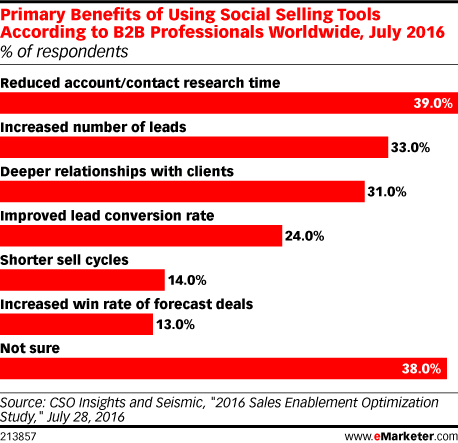Ready to create more pipeline?
Get a demo and discover why thousands of SDR and Sales teams trust LeadIQ to help them build pipeline confidently.





Get a demo and discover why thousands of SDR and Sales teams trust LeadIQ to help them build pipeline confidently.
Social media has impacted the way businesses operate in more ways than one. One of the most revolutionary changes we’ve seen is in the power that social selling holds. Social selling is a lead-generation technique where salespeople directly interact with their prospects on social media platforms like LinkedIn.
According to LinkedIn research, salespeople are 51% more likely to hit quota with social selling. Ultimately, social selling is a leading strategy for helping sales teams achieve goals by answering prospect’s and potential buyer’s questions through thoughtful content and social interactions that provide valuable information.
Social selling refers to using social media to find, connect with, provide value, and nurture sales/ prospect relationships. It’s the modern way for sales representatives to interact and build relationships with prospects and customers. If you’re actively on LinkedIn or have a professional Twitter or Instagram account, you’re already engaged in the basics of social selling.
Social selling is all about using your social network to build a community of prospects, build relationships with those prospects, and ultimately turn those prospects into customers. Social media provides a more laid-back and comfortable environment for creating and building relationships. Not only is social selling the more casual approach, but it’s also has become increasingly successful.
LinkedIn & Social Selling Author, Keynote Speaker, and LinkedIn Trainer, Daniel Disney, shares “A digital presence can have an impact on all areas of sales”.
Research shows that 90% of top decision-makers say that they never respond to cold calls. 90%! Technology is evolving and social media has become a prominent component of business. Building a social network will allow you to seek out prospects and maintain existing relationships with customers, creating a trusted community.
Today’s buyers are more empowered and educated than ever before. They spend time evaluating other options that have made traditional channels like cold calls obsolete.
In a survey by CSO Insights and Seismic, 1 in 3 B2B professionals said that social selling tools increased the number of leads they had to work with, and 39% said that social tools reduced the amount of time they spent researching accounts and contacts.

Sharing content is one of the best ways to start to build credibility and engagement on LinkedIn.
If you come across interesting and relevant articles, share the post with an insightful comment and ask others to engage in the comments. You can even share the post directly to your prospect, if it is related to their industry or pain point. This shows you are listening to your prospect and providing value to them based on what they’ve told you.
For maximum engagement with your social network, you should aim for consistently. This means you should be engaging with other people’s posts as well as creating your own content every week. A tip for maintaining consistency: set 20 minutes aside every day for surfing LinkedIn and engaging.
Sharing real life stories with your network helps build your credibility with potential buyers and allows your network to relate. Sharing customer success stories, in particular, can carry extensive value. According to research by Nielsen, 92% of people will trust a recommendation from a peer, and 70% will trust a recommendation from a complete stranger.
Sharing stories doesn’t have to just be customer success stories. You can share an insightful conversation you had with a prospect that can provide value to people in your industry. “People love stories, they don’t want to be preached to, they want to hear stories about your experience,” which everyone has. “Even if you're a month into your sales role, you have stories from your journey to getting the job, your training experience, your first few conversations.” Stories entertain people, show how you overcame challenges, and ultimately demonstrate your ability to connect to them as a human being.
“People love stories, they don’t want to be preached to, they want to hear stories about your experience.”
Making your own videos and other content can build a sense of personal connection with your network. When it comes to posting on social media, LeadIQ suggests picking one archetype and sticking to it. This will not only help build your personal brand but allow prospects and customers to better connect and build a personal relationship with you.
Tracking your engagements can give you valuable insight on what topics your network is interested in. Social media engagement includes likes, comments, and shares, and higher engagement is an indication that a piece of content truly resonated with your audience.
By tracking what content gets the most attention with your audience, you can see what content or topics are of interest to your prospects, which is a good indication that you should share more about that topic.
Subscribe for updates.